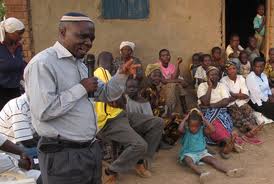The great puzzlement to Jews and non-Jews is that Judaism shares some of the characteristics of a nation, an ethnicity, a religion, and a culture. Can we select only parts of this construct and still claim to be “Jews”? My documentary film, BEAUTIFUL TREE, SEVERED ROOTS adds new perspectives to this age-old question.
My parents were adventurers who chose to live in Africa rather than emigrate elsewhere. They surely knew that in the early 1900s, Zionist leaders, desperate to offer persecuted Jews a safe homeland, were offered a section of northwestern Kenya as sanctuary by the British Colonial Secretary Joseph Chamberlain. The controversial plan was eventually dropped. Had it succeeded, the Holocaust might never have happened as Jews would have been settled far from Europe’s anti-Semitic dictators and our lives might have been very different, as might have been the fate of Jews – and Kenyans – in general.
Viewers familiar with Hollywood films set in colonial Kenya, like OUT OF AFRICA, THE FLAME TREES OF THIKA and I DREAMED OF AFRICA will find a very different social paradigm to colonial Kenya in this documentary. As secular Jews and confirmed Socialists, my parents brought to the colony a unique Weltanschauung. Undoubtedly, their Judeo-Socialist paradigm equipped them to adapt to Africa and to African lifestyles and belief systems almost overnight. Their perspective on Africa and Africans differed vastly from that held by British colonials, who had come not only to exploit and make their fortune, but basically to suppress, enslave and conquer. My parents came to teach, learn and unite. If my parents may be taken as “typical” models, this lends an interesting aspect to the character and aspirations of the European Jew in the African Diaspora.
African Jews in Kenya
As a child, I was perfectly confident in my “Kenyanness” but as I grew older, I realized that our family was British but not English; that we sympathized with African causes but had our own racial prejudices; that my parents promoted racial harmony but forbade their children to enter the African areas of town; that our whiteness did not prevent us from being “different” and – in the eyes of our British friends – “exotic”; that most of my friends had some kind of religious beliefs but that we practiced fierce atheism; that my parents never talked about being Jewish, but would put their lives on the line as Jews if necessary; that for everyone else, England was “home” while for us, Kenya was home, despite our European heritage.
My parents devoted themselves to understanding African culture and improving the lives of Africans, but displayed an ambiguous relationship to African people. Our servants were treated fairly, but definitely as “inferior” beings, lower even than the European peasant, as my mother once stated, whereas educated Africans were befriended.
This raises interesting questions about Jewish-Black relations, traditionally fraught with racial and class tensions, as well as the liberal Jewish desire to “bond” with black victims of suppression, and reveals the complex interplay between international politics, colonial dominance, and anti-Semitic and anti-African racist ideologies.
These endless dichotomies puzzled me for years but I now realize that layers of identity are typical for any refugee, and that they eventually coalesce to form a whole. Identity is fluid, not rigid. Thus I believe that every Jew who examines his or her identity must come to the same conclusion: we are a multi-layered people with a multitude of origins, acquired nationalities and adaptations – perhaps as close to the “global citizen” as anyone will ever get.
I ask whether, in the age of universal digital communications, individuals will recognize their personal identity based not on geographical location or ethnicity but rather on globally shared political and religious/spiritual belief systems, various interests and hobbies and commercial connections. Thus, for example, where we might have been Jews first and environmentalists second in our personal identity construct, we may now be universally recognized as environmentalists first and Jews second, triggering a major paradigm shift in the whole question of identity. While maintaining Jewishness and Jewish practices, in this new world the “Jewish question” may become irrelevant. 
The synagogue in Nairobi
Like many secular Jews, I feel at home everywhere and nowhere, which may be viewed as either a positive attribute for global survival or a negative attribute leading to “tribal” rejection and consequent isolation. Contemporary scholarly work on refugees concludes that new identities are constructed from nostalgia for the lost homeland coupled with either indifference to or passionate assimilation into the new homeland. When my parents arrived in Kenya, they did not let it be generally known that they were Jews, and did not seek out the Jewish community but preferred social adaptation to the mostly British colonial community and to focus their work on indigenous peoples. The Nairobi Hebrew Community recognized them as “real” Jews only because their work conformed to Jewish notions of “tikkum olam” or “healing the world.” Their worldview was passed down to their children, thus we may claim “Jewishness” if for no other reason than this.
Most Jews will call themselves Jews first, and describe their nationality second. I call myself a Kenyan first, with various additional identities lower on the list. Nevertheless, all events in my family history lead to the inescapable fact that we are Jewish and that our destinies have been inevitably formed by this identity, no matter what additional layers of “self” have been added over time. A Jewish scholar whose name I have forgotten said: “If there is a contemporary Jewish ‘identity menu,’ I choose one that is not religious, does not celebrate with traditional foods and holidays, does not speak Hebrew or belong to a particular Jewish community, does not revere Israel as my home, yet will always accept my “Jewishness” even though I am not sure how, exactly, that manifests itself or even whether it matters.” My thoughts exactly.
You have a fascinating background and fascinating blog. Glad I found it.
Thanks so much and apologies for the delay in responding. Hope you enjoy the new blog!